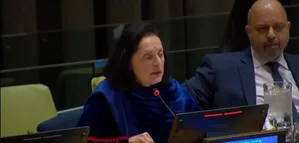India Slams Security Council’s ‘Disguised Veto’ on Listing Pakistan-linked Terrorists
United Nations, March 12 (IANS) India has criticized the Security Council sanctions committee for its secretive practices in blocking the listing of Pakistan-linked terrorists. India’s Permanent Representative Ruchira Kamboj raised concerns about the lack of transparency in the decision-making process, accusing the committee of allowing a system of “disguised veto”.
Kamboj highlighted the issue of legitimate listing proposals for globally sanctioned terrorists being blocked without any justification. She emphasized the importance of transparency and called for reforms within the Council to ensure fairness and accountability in tackling the challenge of terrorism.
China has been specifically mentioned for repeatedly blocking the listing of Pakistan-linked terrorists as international terrorists subject to UN sanctions. The recent case involving the designation of Lashkar-e-Taiba’s Sajid Mir, the mastermind behind the 2009 Mumbai terrorist attack, was cited as an example of this practice.
Kamboj also emphasized the need for transparency in the working methods of Council committees, urging for a more open and consultative process in selecting chairs for the panels. She emphasized the necessity for Council reforms that reflect contemporary realities and ensure the representation of developing countries and underrepresented regions.
The main obstacle to reforms, as highlighted by Kamboj, is the position of a minority group, Uniting for Consensus, which includes Pakistan as a leading member. She called for a more focused and text-based negotiation process to address entrenched national positions and move towards meaningful reform within the Council.
Overall, the call for reforms within the Security Council comes in light of ongoing conflicts in Ukraine and Gaza, showcasing the Council’s limitations in addressing global peace and security issues. Kamboj urged member states to prioritize genuine reform efforts to make the Council more effective and responsive to 21st-century challenges.

 Jasmine Crockett Net Worth 2024: How Much is the United States Representative Worth?
Jasmine Crockett Net Worth 2024: How Much is the United States Representative Worth? New COVID-19 Variant Alert! KP.2 Can Bypass Your Immunity—How You Can Protect Yourself, Learn Everything
New COVID-19 Variant Alert! KP.2 Can Bypass Your Immunity—How You Can Protect Yourself, Learn Everything #Blockout2024: Why are A-Grade Celebrities Being Blocked And Reported On Social Media?
#Blockout2024: Why are A-Grade Celebrities Being Blocked And Reported On Social Media? Burnsview Secondary School Placed Under Lockdown For Prank Call, Investigation Underway
Burnsview Secondary School Placed Under Lockdown For Prank Call, Investigation Underway  Flagstaff Shooting At Bushmaster Park In Arizona, Armed and Dangerous Suspect Arrested
Flagstaff Shooting At Bushmaster Park In Arizona, Armed and Dangerous Suspect Arrested Lawsuit Slapped Against Chicago-Area Teacher And High School For Childhood Sexual Abuse
Lawsuit Slapped Against Chicago-Area Teacher And High School For Childhood Sexual Abuse 10 YO Sammy Teusch from Indiana Killed Himself After Relentless Bullying At School
10 YO Sammy Teusch from Indiana Killed Himself After Relentless Bullying At School Taxi Drivers Welcome Ruling That Found City Of Ottawa Negligent In Allowing Uber To Operate
Taxi Drivers Welcome Ruling That Found City Of Ottawa Negligent In Allowing Uber To Operate